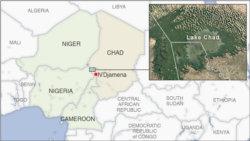The U.N. refugee agency is calling for urgent action to stop the killing and maiming of refugees and other forcibly displaced people from landmines and improvised explosive devices in Africa’s Sahel and Lake Chad basin regions.
Deaths and injuries from these indiscriminate killing machines are rising at an alarming rate. Security forces reportedly are the intended targets of attacks by various armed groups operating in Africa’s conflict-ridden Sahel and Lake Chad basin. But the U.N. refugee agency says civilians are paying the heaviest price.
UNHCR spokesman, Babar Baloch says landmines and unexploded ordnance are posing a growing threat to refugees, internally displaced people and the local communities hosting them. He says many of the victims are children under age 18.
“Chad and Nigeria top the most affected countries in the lake Chad Basin," he said. "In the most recent incident in a refugee camp in the east of the country on June 24, four refugee children aged from 9 to 12 were killed and three others were seriously injured when they picked up an unexploded device and tried to open it.”
Baloch says hundreds of deaths and injuries from landmines and improvised explosive devices have been reported in Northeastern Nigeria. He says UNHCR teams on the ground have witnessed a rising trend in the Sahel in the killing and maiming of civilians from these lethal weapons.
The Sahel is facing one of the fastest growing displacement crises in the world. Baloch notes millions of people have fled indiscriminate attacks and widespread violations from armed groups, including summary executions and rape.
“In addition to the high death toll, injuries and their after-effects, including psychological damages, the presence of explosive devices hinders access to local livelihoods such as pastures, fields, farms, firewood as well as community infrastructure. They also affect the delivery of humanitarian aid and development activities,” he said.
The UNHCR is calling on governments and humanitarian organizations to speed up the removal of these dangerous weapons. It says awareness campaigns must be expanded to inform populations at risk about the horrifying threats they face and what they can do to protect themselves from these barbaric weapons of war.
The Landmine and Cluster Munitions Monitor reports more than 120,000 civilian deaths and injuries have been documented since the landmine ban came into force in 1999. It reports casualties continue to rise despite the ban.

